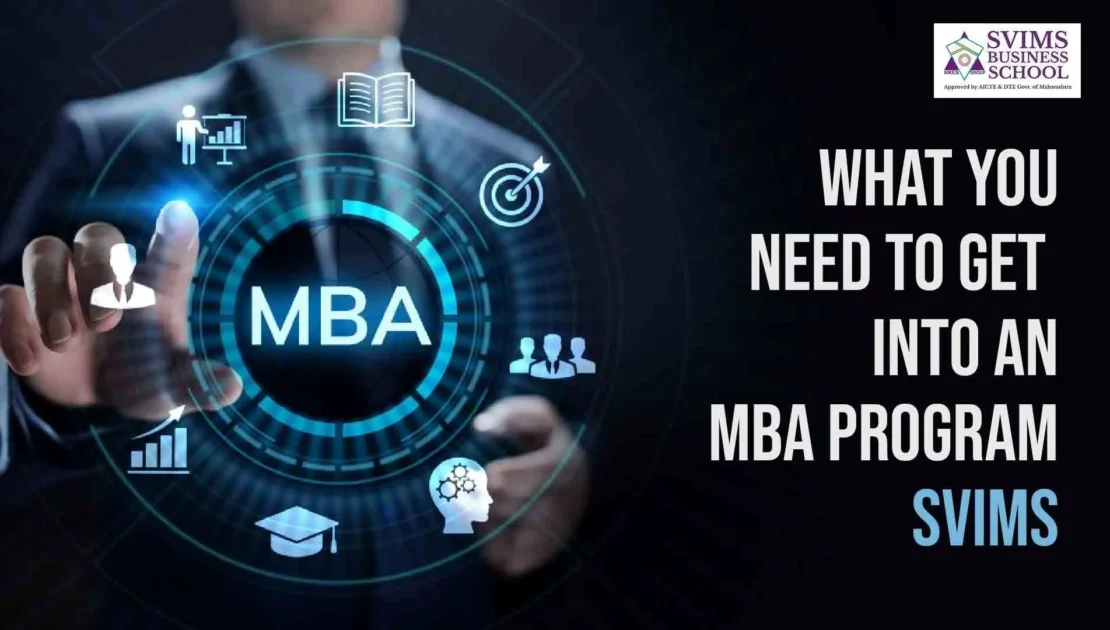What You Need to Get into an MBA Program | SVIMS
What You Need to Get into an MBA Program | SVIMS

What You Need to Get into an MBA Program: A Comprehensive Guide to MBA Admission Requirements
Pursuing a Master of Business Administration (MBA) is a transformative step toward achieving professional success in the business world. If you’re considering an MBA program, understanding the admission requirements is crucial to ensuring your application stands out. This guide explores the key requirements for MBA admission, focusing on SVIMS’s offerings to help you prepare for your journey.
1. Academic Qualifications
Most MBA programs require a strong academic foundation. At SVIMS, candidates must fulfil these essential criteria:
- Bachelor’s Degree: A recognized undergraduate degree in any discipline is a fundamental requirement. A minimum aggregate percentage, typically 50% or above, is often preferred.
- Special Considerations: Candidates with exceptional achievements or relevant work experience may receive some flexibility in academic scores.
2. Standardized Test Scores
Many MBA programs require scores from standardized tests to assess candidates’ aptitude for management studies. For SVIMS, these tests are often considered:
- Entrance Exams: Common tests include CAT, MAT, XAT, CMAT, or GMAT. Check SVIMS’s specific test score requirements for details.
- Performance Benchmarks: Competitive scores improve your chances of admission. Research the score ranges of previously admitted students to gauge your target.
3. Work Experience (Preferred but Not Mandatory)
While many MBA programs welcome fresh graduates, having professional work experience can strengthen your application:
- Relevance: Experience in business, finance, marketing, or related fields can demonstrate practical knowledge.
- Leadership Roles: Highlighting leadership positions or impactful project contributions can make your profile stand out.
- SVIMS Policy: Work experience is preferred for specific specializations but not mandatory for MMS programs.
4. Specializations to Consider
Choosing the right specialization is vital to align your MBA with your career goals. SVIMS offers a variety of options:
- Human Resources (HR): For those passionate about organizational development and talent management.
- Finance: Ideal for investment, banking, and financial strategy candidates.
- Marketing: Focused on brand development, consumer behaviour, and digital marketing.
For more details, visit SVIMS’s Specializations Page.
5. Application Documents
Prepare a complete set of documents to showcase your qualifications and achievements:
- Academic Transcripts: Include certificates from your undergraduate studies and any additional qualifications.
- Statement of Purpose (SOP): Write a compelling narrative about why you want to pursue an MBA and how it aligns with your career aspirations.
- Letters of Recommendation (LOR): Obtain recommendations from professors or employers who can vouch for your skills and potential.
- Resume: Highlight academic, professional, and extracurricular accomplishments.
6. Fee Structure and Financial Planning
Understanding the fee structure is essential for financial planning. SVIMS offers a transparent and detailed breakdown of tuition and other costs:
- Program Fees: The fee structure for the MMS I Year program for 2024-25 is available on this page.
- Scholarships: Look for scholarships or financial aid options to reduce the burden of tuition costs.
7. Personal Interview and Group Discussion
Once you clear the initial screening, most MBA programs, including SVIMS, conduct interviews or group discussions to evaluate candidates:
- Personal Interview (PI): Be prepared to discuss your background, career goals, and motivations for pursuing an MBA.
- Group Discussion (GD): Showcase your communication, analytical, and teamwork skills during group exercises.
8. Soft Skills and Extracurricular Activities
Demonstrating well-rounded capabilities can set you apart:
- Leadership: Highlight instances where you successfully led teams or initiatives.
- Communication: Excellent written and verbal communication skills are essential.
- Extracurriculars: Showcase involvement in activities like volunteering, sports, or cultural programs to emphasize your diverse skill set.
Conclusion
Securing admission into an MBA program requires thorough preparation and a clear understanding of the requirements. At SVIMS, the process is designed to identify candidates with potential, ambition, and a drive for excellence. You can maximise your chances of joining a top-notch program by focusing on academic qualifications, standardized test scores, relevant experience, and personal attributes.
Prepare early, align your application with SVIMS’s expectations, and take the first step toward a transformative educational experience. For more details on courses and requirements, visit SVIMS Course Details.



